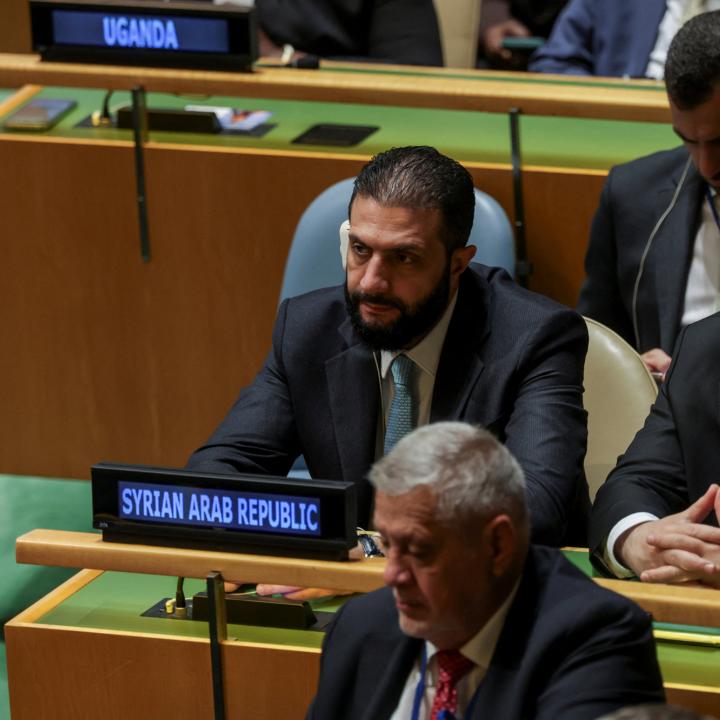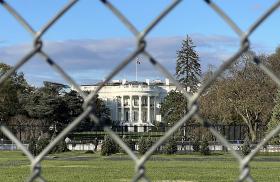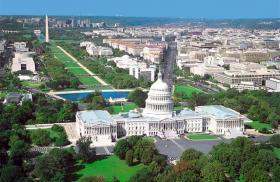

After meeting with Sharaa and returning from an extensive research trip in Syria, a Washington Institute expert sheds light on the president’s UN speech, near-term plans, and views on the U.S. role.
President Ahmed al-Sharaa’s appearance at the UN General Assembly this week marks his country’s official return to the international community. Given that he is the first sitting Syrian president to deliver a UNGA address since 1967, he and his supporters see the occasion as a chance to reintroduce the world to the new Syria. For them, this transformed Syria is a rising star with lots of potential after years of civil war. Yet the postwar challenges are immense, and not everyone back home is satisfied with the country’s current trajectory—something Sharaa and his government are aware of and frank in discussing.
For Washington, understanding these nuances has taken on greater importance because the transitional government has adopted a geopolitical posture that is inimical to Iran and more in line with the United States and its alliance system. Many prefer to view Syria’s current state of affairs in black-or-white terms, but the reality is far more complex. Based on the author’s personal meeting with President Sharaa last week and wide-ranging research trip to Syria, this article aims to shed light on where the country is headed nearly ten months after the regime’s fall—beginning with the content of Sharaa’s landmark UNGA address and its implications for U.S. policy.
Sharaa’s Speech
Based on conversations with Sharaa, his advisors, and several Syrian government officials, most of his speech will be forward-looking, discussing new opportunities with the world rather than dwelling on the past—what they view as a 180-degree difference from the Assad regime. Key topics include:
Investment and reconstruction. Sharaa’s top subjects will be postwar economic recovery and rebuilding the country. This is why he and his team have been meeting with business figures at the Concordia investor summit and the U.S. Chamber of Commerce since arriving in New York. In particular, they seek more investment to alleviate humanitarian suffering back home. Yet many Syrians worry that opening the country to large-scale foreign investment without creating domestic protections could destroy local businesses if they cannot compete with lower-priced imports, further damaging an already floundering middle class.
Sharaa also hopes that his economic focus will show the world that Syria is more than just the intercommunal violence that has made headlines over the past few months. In his view, focusing solely on those problems misses the bigger picture of what his government has achieved so far: namely, garnering multi-billion-dollar deals with companies and government agencies in the Persian Gulf, Turkey, and the West; pushing Hezbollah and Iranian regime elements out of Syria; combatting both Captagon smugglers and Islamic State (IS) terrorists; and beginning the process of rebuilding schools, health facilities, and factories.
Transitional justice issues. Despite these achievements, if Sharaa tries to publicly play down the atrocities that occurred in the coastal region and Suwayda province this year, he risks perpetuating the disconnect between his circle and those Syrians still skeptical of his rule in an economically devastated country. The same is true if he continues to reject even reasonable proposals for more decentralized governance as just dangerous “separatist” sentiment—though some in northeast Syria and Suwayda do aim for separation.
Untangling these complicated issues will be crucial going forward. To help in that task, Sharaa’s speech will likely note the progress Damascus has made on transitional justice, including the committee that investigated the coastal violence, the new, soon-to-be-reported fact-finding committee on the violence in Suwayda, and the formation of a National Authority for Transitional Justice and National Commission for Missing Persons. Yet many Syrians outside the government have no idea that such progress is being made behind the scenes, creating a perception that Sharaa’s team has no serious long-term plan for postwar accountability. This strange set of affairs is deliberate—according to various Syrian officials, they have avoided updating the public on the process before it is complete for fear that doing so could undermine their investigations. Yet the unintended consequence of this approach is public alienation and more violence, with some Syrians taking justice into their own hands by killing former regime officials.
Weapons and militia integration. Sharaa’s speech will likely cover the importance of the state having a monopoly on arms, which means reiterating his stance that the Kurdish-led Syrian Democratic Forces (SDF) and the Druze “National Guard” forces backed by cleric Hikmat al-Hajri need to integrate into the new Syrian army. Yet the aforementioned incidents on the coast and in Suwayda have made this effort much more of an uphill battle.
Stance toward Israel. Sharaa will no doubt mention Israel’s continued airstrikes and cross-border incursions. In doing so, he will presumably note that these actions have been unprovoked, that his government has repeatedly called for continuing the 1974 disengagement agreement, and that Damascus merely wants to be left alone so it can rebuild the country. Coming on the heels of widespread international backlash against Israel’s airstrike in Qatar, there will be much sympathy at the UNGA for Sharaa’s comments on this topic.
U.S. Policy Implications
While acknowledging Sharaa’s understandable policy priorities and seeking to further strengthen budding bilateral ties, Washington should use the occasion of his speech and visit to reiterate key U.S. interests. This includes reminding Damascus that U.S. pressure—real and perceived—is often tied to concerns about the welfare of the Syrian people and their country’s future economic and political success. Notably, Secretary of State Marco Rubio and Sen. Jeanne Shaheen (D-NH) met with the Syrian diplomatic team yesterday, President Trump met with Sharaa earlier today, and more bilateral meetings may yet unfold later this week.
In the months leading up to the UNGA, much of the Trump administration’s policy focus on Syria has been related to undoing sanctions, partnering on security issues (e.g., the ongoing fight against IS), finding missing Americans (though unfortunately there is no news about missing journalist Austin Tice despite continued Syrian government investigations), facilitating integration with the SDF, and attempting to update the 1974 border agreement with Israel. Yet the latter two issues still carry major risks, and a third transitional issue is not being adequately addressed:
- Taking the next steps with the SDF. As the deadline approaches for integrating the SDF with the national army by year’s end, there is no sign that this goal will be met, and many are worried that both sides will give up on substantive talks and try to position themselves for a potential fight ahead. The United States should work judiciously to prevent such an outbreak, not only because it could derail Syria’s transition, but also because it might spark a proxy war between Turkey and Israel. Put another way, Washington needs to get Damascus and the SDF to concede certain points so they can be more comfortable about a deal without being 100 percent happy about it. The main goal should be administrative decentralization, not political decentralization. In addition, U.S. authorities should try to establish a joint operations room for Damascus and the SDF’s mutual fight against IS, both to improve operations and to build rapport. They should also consider an updated interim deal for transferring oil from the hydrocarbon-rich territories controlled by the SDF, which could help ease tensions stemming from the current informal trade.
- Easing friction with Israel. Some officials have discussed forging a revised “1974-plus” agreement between Damascus and Jerusalem, but all parties need to understand the complexities involved in actually reaching such a deal. Although Sharaa has noted his willingness to work on this issue any time, he also worries that Israel might not stick to the agreement even if one is signed. Consequently, the Trump administration should realize that it will need to step up and be the guarantor of any such deal. For instance, it could take some of the limited U.S. military assets already in Syria and move them to the border province of Deraa, which could have the dual benefit of assuaging Israeli worries about that frontier while putting a lid on the local IS assassination operations that have increased in recent months. In fact, such a move could be legally categorized as part of the mission of the Global Coalition Against IS, highlighting another way in which U.S. counterterrorism efforts can evolve now that Washington has working relations with the Syrian government. Ideally, an Israel-Syria arrangement of some sort could be struck this week, potentially improving local and regional conditions at a tense time.
- Addressing housing, land, and property (HLP) problems. Washington should do more to assist the new government with these problems, which have spiked now that more Syrian refugees are returning to their country. For example, the Assad regime expropriated countless properties during and before the civil war, and a Turkish-backed militia (the Syrian National Army) has been known to seize property in Kurdish areas. Without a process that allows individuals to regain their homes or businesses, some are resorting to blackmail, while others are forcibly displacing people who have lived on said property for many years themselves (in some cases up to four or five decades). In response, Washington should use relevant international organizations to help Damascus streamline recordkeeping on property issues and develop an updated civil registry. The latter effort would not only ameliorate the HLP issue, but also provide more robust data to assist with planning national elections by the end of the transition—something Sharaa has stated he wants to happen.
Although Syria has many other challenges to address, making visible progress on these three issues could help set Syria up for success as it heads toward the anniversary of Bashar al-Assad’s ouster. Interestingly, Sharaa believes that the challenges he faces today are easier than those he faced when ruling his rebel enclave in Idlib during the war—perhaps because he sees the fall of the regime as a miracle of sorts. Whatever the reason, Washington should regard his enthusiasm as a rare opportunity to help (and shape) the new Syria succeed after it was shunned for decades under the Assads.
Aaron Y. Zelin is the Gloria and Ken Levy Senior Fellow at The Washington Institute and author of The Age of Political Jihadism: A Study of Hayat Tahrir al-Sham.



